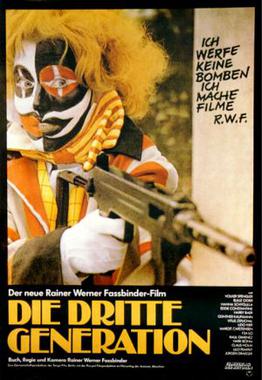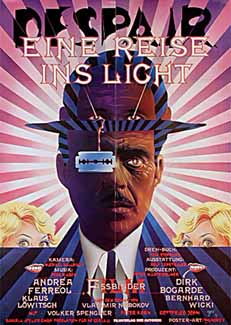Related Research Articles

Rainer Werner Fassbinder, sometimes credited as R. W. Fassbinder, was a German filmmaker, actor, and dramatist. He is widely regarded as one of the major figures and catalysts of the New German Cinema movement. Versatile and prolific, his over 40 films span a variety of genres, most frequently blending elements of Hollywood melodrama with social criticism and avant-garde techniques. His films, according to him, explored "the exploitability of feelings". His work was deeply rooted in post-war German culture: the aftermath of Nazism, the German economic miracle, and the terror of the Red Army Faction. He worked with a company of actors and technicians who frequently appeared in his projects.

Querelle is a 1982 English-language arthouse film directed by Rainer Werner Fassbinder and starring Brad Davis, adapted from French author Jean Genet's 1947 novel Querelle of Brest. It was Fassbinder's last film, released shortly after his death at the age of 37.
New German Cinema is a period in German cinema which lasted from 1962 to 1982, in which a new generation of directors emerged who, working with low budgets, and influenced by the French New Wave and Italian Neorealism, gained notice by producing a number of "small" motion pictures that caught the attention of art house audiences. These filmmakers included Percy Adlon, Harun Farocki, Rainer Werner Fassbinder, Peter Fleischmann, Werner Herzog, Alexander Kluge, Ulli Lommel, Wolfgang Petersen, Volker Schlöndorff, Helma Sanders-Brahms, Werner Schroeter, Hans-Jürgen Syberberg, Margarethe von Trotta and Wim Wenders. As a result of the attention they garnered, they were able to create better-financed productions which were backed by the big US studios. However, most of these larger films were commercial failures and the movement was heavily dependent on subsidies. By 1977, 80% of a budget for a typical German film was ensured by a subsidy.

Margarethe von Trotta is a German film director, screenwriter, and actress. She has been referred to as a "leading force" of the New German Cinema movement. Von Trotta's extensive body of work has won awards internationally. She was married to and collaborated with director Volker Schlöndorff. Although they made a successful team, von Trotta felt she was seen as secondary to Schlöndorff. Subsequently, she established a solo career for herself and became "Germany's foremost female film director, who has offered the most sustained and successful female variant of Autorenkino in postwar German film history". Certain aspects of von Trotta's work have been compared to Ingmar Bergman's features from the 1960s and 1970s.

Hanna Schygulla is a German actress and chanson singer associated with the theater and film director Rainer Werner Fassbinder. She first worked for Fassbinder in 1965 and became an active participant in the New German Cinema. Schygulla won the 1979 Berlin Silver Bear for Best Actress for Fassbinder's The Marriage of Maria Braun, and the 1983 Cannes Film Festival Award for Best Actress for the Marco Ferreri film The Story of Piera.

The Marriage of Maria Braun is a 1978 West German drama film directed by Rainer Werner Fassbinder. The film stars Hanna Schygulla as Maria, whose marriage to the soldier Hermann remains unfulfilled due to World War II and his post-war imprisonment. Maria adapts to the realities of post-war Germany and becomes the wealthy mistress of an industrialist, all that while staying true to her love for Hermann.

Veronika Voss is a 1982 West German black-and-white drama film directed by Rainer Werner Fassbinder, and starring Rosel Zech, Hilmar Thate, and Cornelia Froboess. Loosely based on the career of actress Sybille Schmitz, the film follows the titular Veronika Voss, a morphine-addicted film star in 1955 Munich who begins an affair with a sports journalist; soon after, he discovers that Veronika is under the control of a corrupt neurologist scheming to bleed her of her wealth.

Ali: Fear Eats the Soul is a 1974 West German drama film written and directed by Rainer Werner Fassbinder, starring Brigitte Mira and El Hedi ben Salem. The film won the International Federation of Film Critics award for best in-competition movie and the Prize of the Ecumenical Jury at the 1974 Cannes Film Festival. It is considered to be one of Fassbinder's most powerful works and is hailed by many as a masterpiece.

Barbara Sukowa is a German actress of screen and stage and singer. She has received three German Film Awards for Best Actress, three Bavarian Film Awards, Cannes Film Festival Award for Best Actress, Venice Film Festival Award, as well as nominations for European Film Awards, César Awards and Grammy Awards.

The Third Generation is a 1979 West German film, a black comedy about terrorism, written and directed by Rainer Werner Fassbinder. The plot follows an ineffectual cell of underground terrorists who plan to kidnap an industrialist.
El Hedi ben Salem was a Moroccan actor, best known for his work with film director Rainer Werner Fassbinder.
Ingrid Caven is a German film actress and singer. She is best known for her roles in several films directed by her husband, Rainer Werner Fassbinder, including Love Is Colder Than Death (1969), Why Does Herr R. Run Amok? (1970), and The American Soldier (1970). She continued to appear in Fassbinder's films after their 1972 divorce until his death in 1982. She has also appeared in Silent Night (1995), 35 Shots of Rum (2009) and Suspiria (2018).

Despair is a 1978 film directed by Rainer Werner Fassbinder and starring Dirk Bogarde, based on the 1934 novel of the same name by Vladimir Nabokov. It was Fassbinder's first English-language film and was entered into the 1978 Cannes Film Festival.

Margit Carstensen was a German theatre and film actress, best known outside Germany for roles in the works of film director Rainer Werner Fassbinder. She appeared in films of directors Christoph Schlingensief and Leander Haußmann and on television in Tatort.
Filmverlag der Autoren is a German film distributor that was founded in 1971 to help finance and distribute independent films by German Autorenfilm directors, who are renowned for predominantly adapting their own screenplays. Called "The Flagship", many directors of the New German Cinema movement were associated with Filmverlag der Autoren, such as Werner Herzog, Rainer Werner Fassbinder, Wim Wenders, Percy Adlon, and Alexander Kluge, whose films were produced and distributed by the company, and many of whom were members of the Filmverlag board.
Harry Baer is a German actor, producer and author, best known for his work with director Rainer Werner Fassbinder. He has also been credited as Harry Bär.
Reginald Beck was a British film editor with forty-nine credits from 1932 to 1985. He is noted primarily for films done with Laurence Olivier in the 1940s and with Joseph Losey in the 1960s and 1970s.

Robert Greene is an American documentary filmmaker, editor, and writer. His documentaries include Procession, Bisbee '17, Kate Plays Christine, Actress, and Fake it So Real. He was named one of the 10 Filmmakers to Watch in 2014 by The Independent, and is "filmmaker-in-chief" at the Murray Center for Documentary Journalism at the University of Missouri, beginning in 2015.
Rainer Werner Fassbinder was a German filmmaker.
The Stationmaster's Wife is a 1977 German television serial directed and edited by Rainer Werner Fassbinder. It was made for German television and originally aired in 1973 as a two-part miniseries. It was based on the 1931 novel Bolwieser: The Novel of a Husband by Oskar Maria Graf.
References
- 1 2 Fassbinder's Legacy @ 25 Archived 2009-07-14 at the Wayback Machine from GreenCine Daily
- 1 2 Dreams of Fassbinder: An Interview with Juliane Lorenz Archived 2008-12-05 at the Wayback Machine at Senses of Cinema
- ↑ The Unusual Life of Juliane Lorenz
- ↑ Rosalind Hodgkiss "The bitter tears of Fassbinder's women", guardian.co.uk, 5 January 1999